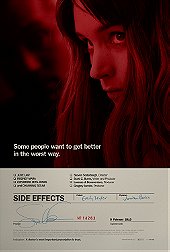Side Effects is not a motion picture that easily lends itself to a review, as it's hard to talk about this sophisticated thriller without revealing the numerous surprises that make it an enthralling watch. The screenplay by Scott Z. Burns (Contagion) is laden with plot twists, hence potential viewers are advised to watch the movie before reading too much about it. All you need to know is that Side Effects is a terrific film crafted by a superlative director starring a solid cast, and it delves into intriguing subject matter. In fact, if the movie had been made four decades ago, it most certainly would have been directed by Alfred Hitchcock, as Burns' script incorporates a number of Hitch's staples. It ventures into conventional plotting territory into its third act, yet it's handled with superb sleight of hand, and it offers genuine surprises as twists are revealed, and our perceptions of events and characters begin to change.

A young woman living in New York City, Emily Taylor (Rooney Mara) is ready to welcome her husband Martin (Channing Tatum) back into her life after he's released from a four-year prison stint. Emily should be happy about Martin's return, but she cannot shake severe feelings of depression and unhappiness, leading to a suicide attempt that lands her in the hospital under the care of psychiatrist Dr. Jonathan Banks (Jude Law). Although Banks prescribes antidepressant medication, Emily's condition seldom improves. Until, that is, Banks prescribes a new form of medication recommended by Emily's former therapist (Catherine Zeta-Jones). While Emily's new meds appear to be working, a side effect emerges: she sleepwalks at night, cranking up music and making meals. When one sleepwalking incident ends in tragic circumstances, Emily is suddenly thrust into a court case, while Dr. Banks fears that investigators will ultimately turn the blame onto his medical expertise.
Burns and director Steven Soderbergh previously worked together on the topical drama Contagion, and Side Effects similarly touches upon important, news-worthy scenarios. At the outset, the movie explores a handful of controversial topics, including the ethics of carelessly distributing prescription drugs, the devious practices of major pharmaceutical companies, and the power given to psychologists who can control and manipulate their patients. But while these themes run throughout Side Effects, it ultimately segues into more of an investigative mystery with shades of film noir. The shift could have felt unnatural and jarring, but Soderbergh pulls off the transition with ease, retaining the clinical drama tone and never relinquishing the picture's intelligence. It's a somewhat Hitchcockian twist (think Vertigo, though Soderbergh is not that good); in fact, the film tackles the "innocent man wrongly accused" theme that the Master of Suspense was such a fan of. It's ultimately difficult to categorise the movie as a whole - it's at once a deceptive character study, a compelling drama, a message movie, and a mystery-thriller.

While the narrative is old-fashioned, Soderbergh's cinematic approach is distinctly contemporary. Acting as his own cinematographer (as usual), the director's technique is subdued yet effective, keeping the picture grounded even when things grow a little sensationalised. Soderbergh handles Side Effects with precision, shooting digitally with Red Epic cameras. It's not as glossy as a more traditional film; rather, the look is colder and more utilitarian. Soderbergh also furthers the Hitchcock comparisons with a Psycho-esque opening shot that pans across the city and through an apartment window to reveal a blood-stained murder scene. Subsequently, the film flashes back three months to show the lead-up. But while an opening like this usually reveals the endpoint, here we learn what happens by the middle of the film.
The actors sell everything in the film extraordinarily well. Mara is especially strong as Emily; her role is multifaceted, yet Mara effortlessly pulls off all requirements. It's a different performance for Mara, who was also glimpsed in The Social Network and David Fincher's remake of The Girl with the Dragon Tattoo. However, it's Law who carries the entire film as the well-meaning, charismatic psychiatrist. Law's work is exceptional here, supplying an affable anchor to keep us interested in the complex narrative machinations. Meanwhile, Tatum (who was also in Soderbergh's surprise hit Magic Mike) is strong here, as well. Tatum used to be a stiff performer, but he has honed his craft over recent years and is now a surprisingly reliable presence. Rounding out the main players is Zeta-Jones, who is also in fine form.

Despite its strengths, Side Effects is no masterpiece. With so many complicated machinations happening throughout the narrative, the ending seems to wrap things up too neatly and quickly, as if Soderbergh wanted to rush through to the finish line to get to his retirement. If Side Effects indeed turns out to be Soderbergh's final theatrical motion picture, as the filmmaker has been saying, then it's not an inappropriate swansong; the crisp digital photography, air of cynicism and strong performances are all in keeping with the director's strongest efforts. Soderbergh is a voice in cinema that will be missed, as he's capable of creating both well-made blockbusters and enthralling talky dramas. How fitting that Side Effects is essentially a fusion of those two opposing sensibilities, reminding us just why Soderbergh is such an interesting filmmaker. It's not his best film at all, but it is intelligent and engaging.
7.9/10
 Login
Login